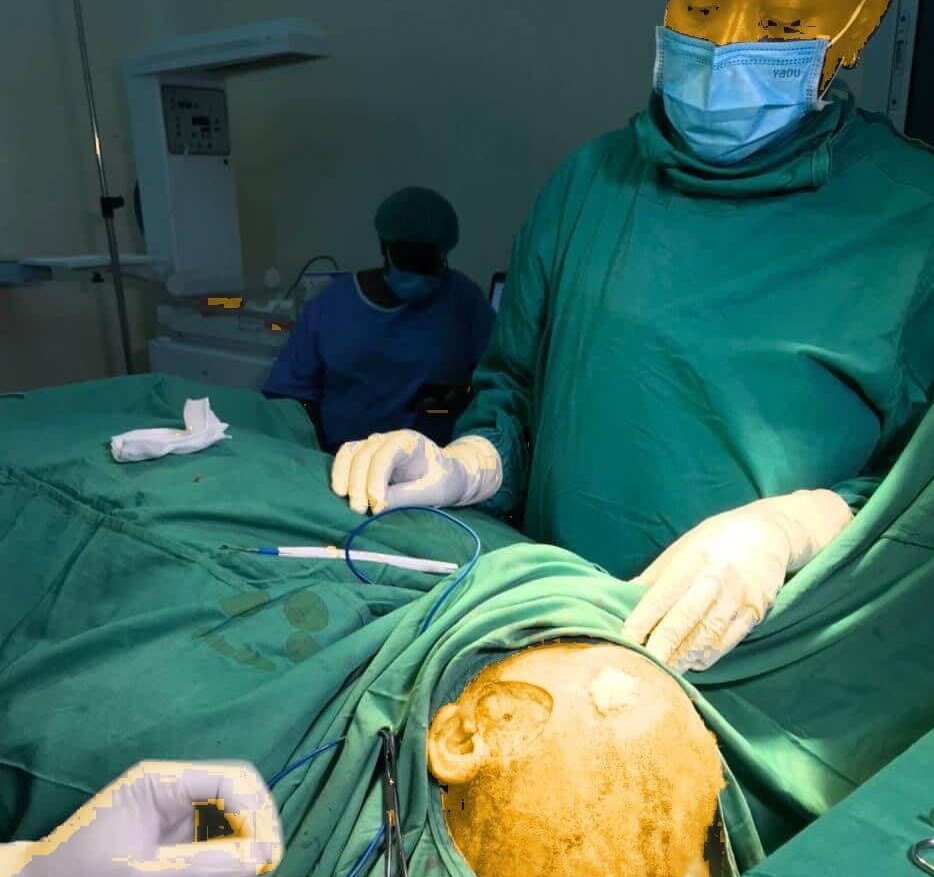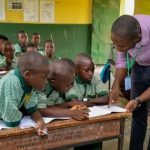BERTOUA, CAMEROON: Damase Cyrille is a person living with albinism in Bertoua, the capital of Cameroon’s Eastern Region. He has had to deal with issues common among people with his condition as he grew up, including vision impairments, skin problems, and stigmatisation.
The 32-year-old became concerned in 2019 when he observed a tumour growing on his head. He had thought since the tumour was tiny, it was benign and would fade away with time. But by 2021, the growth had progressed in size and gotten severely painful. He discovered later that skin cancer, which is frequent in people with albinism, caused the growth.
“People living with albinism tend to suffer from skin cancer because they do not have enough melanin in their body to help them withstand the sun’s rays and heat,” said Kemsi Burabari, a medical doctor at the University of Port Harcourt Teaching Hospital in southern Nigeria.
Melanin is a substance in the body that produces and determines the colour of a person’s eyes, skin and hair. The more melanin a person’s body produces, the darker their hair, eyes and skin. Generally, albinos’ bodies produce insufficient amounts of melanin.
‘…help me out’
At least one out of 17,000 people worldwide is affected by albinism. In Sub-Saharan Africa, the prevalence of albinism is between one in 5000 and one in 15,000 people. When compared to the average African population, people with albinism have 1,000 times the chance of acquiring skin cancer due to a lack of melanin.
By January 2021, Cyrille’s condition had deteriorated to the point where he needed surgery. The cost of surgical removal of skin cancer in albino patients with skin grafting or reconstruction in Cameroon, including the cost of the microscopic examination, can range from CFA600,000 franc ($981.19) to CFA700,000 franc ($1,144.73), said Mouelle Wilfred, a medical doctor at the Bonassama District Hospital in Cameroon.
And some skin cancers require chemotherapy or radiotherapy, which could significantly shoot up the cost.
Cyrille could not afford the money needed for his surgery. So in February 2021, he took photos of his face with the condition and posted them on Facebook with an appeal for financial support.
“Benefactors, good-hearted souls, I beg you to help me find a solution to my health condition. I’ve been suffering from this disease in the form of a tumour for almost two years. Sometimes it tries to end, but this time nothing. It develops more and more, making me seriously uncomfortable,” he wrote.
“Really help me out. I don’t have support, [the] reason why I beg you to help me. It’s not a scam; you can call or come and see. I am from Cameroon; I live in Eastern Cameroon Bertoua…. I rely on your generosity.”
Despite the post being reshared 303 times with about 128 reactions and 152 comments, for over a month, help didn’t come for him, but he continued sending out the appeal.
“It was not easy, but I had to do it because the tumours were growing bigger and making me uncomfortable,” he said.
Help at last
Mouelle Wilfred, the medical doctor at the Bonassama District Hospital, doubles as coordinator of Albicare for Cameroon. Albicare is a project run by the Volunteer for Palliative Care Association or VOPACA, a Cameroonian nonprofit dedicated to fighting cancer and providing palliative care to cancer patients and their families.
Dina Esther, a medical oncologist, started this nonprofit in 2016. It operates in three Cameroonian cities: Douala, Dibombari, and Bafia.
VOPACA is involved in a variety of programs to help cancer patients. Albicare program, for example, is a four-year charity effort that aims to provide free skin cancer treatment and operations, as well as education and consultations to persons with albinism. The project, which began in 2020, will end in December 2024.
Wilfred came across Cyrille’s Facebook post in March 2021 and quickly reached out to him. “He (Wilfred) asked me to come to the [Bonassama District] hospital at Douala,” said Cyrille.
On his first day at the hospital in April, Cyrille met other persons living with albinism for an awareness programme. Albicare’s team began by educating Cyrille and other participants on how to recognise and manage the numerous skin problems people with albinism suffer.
“Skin health specialists took time to tell us about the skin of people living with albinism, how to preserve and protect it, especially from bad weather, sun, and heat,” Cyrille said.
The learning session was part of Albicare’s awareness campaigns to educate people about albinism-related skin problems.
“The main objective of this project is to significantly reduce benign and malignant skin conditions in people living with albinism in Cameroon,” Wilfred said.
Albicare project runs its activities at the Bonassama District hospital located in the 4th arrondissement (administrative district) of Douala and at the Clinique Des Cites, a clinic in the 5th arrondissement of the same city.
“Sometimes, we take this awareness to social media where we engage in large digital campaigns urging people living with albinism as well as their families to follow our activities and learn how to take care of their skin,” Wilfred said.
After completing the learning process, Albicare gave Cyrille and other participants sunscreen, which is required to protect them from the sun’s ultraviolet radiation.
Albicare then scheduled Cyrille’s surgery for a week after his first visit to the hospital. Bola Antoine, a maxillofacial surgeon, led the operation, supported by Abanda Gabriel, a general practitioner, and Albicare’s coordinator, Wilfred. Cyrille had a successful surgery; his tumours were removed, and he returned to Bertoua.
Albicare has reached about 300 people living with albinism in Cameroon since 2020 and has conducted skin cancer operations on 30 people. The organisation distributes sunscreen, moisturising lotions, and lipsticks to people with albinism and provides free counselling services.
To help people living with albinism deal with their self-esteem, Albicare conducts a one-day “meet and fits” (fitness exercises) and self-confidence and stress management workshops once every two months. The last one was held in April 2022.
C’était super indeed . On se donne rendez vous entre le 02 et le 07 juillet pour la Campagne Chirurgicale Albicare for Cameroon .!
Ps : Non ce n’est pas moi le BG qui fait le décalé chinois à la 13 ieme seconde , c’est @BilleEKG .!❤️?? https://t.co/TdT85MMfzbpic.twitter.com/G5GPNIbrZc— Wilfred Mouelle .! (@Wilfred_Mouelle) April 19, 2022
Lots of challenges
VOPACA funds its programmes, including Albicare, through donations from organisations like HD Bonassama, ASCOVIME, Pierre Fabre, and Medi Action Cameroun. Despite this, Wildred said there is hardly enough funding to help as many albinos as they desire and implement some of its most pressing needs – including conducting follow-ups and getting an office space – the organisation currently does not have one.
“We had initially planned to implement this project over four years. The will is there, but most times, we come up against financial worries,” Wilfred said. The group hopes to continue the initiative beyond 2024 if it lands some reasonable financial assistance or a grant to sustain it.
Albicare also faces a shortage of professional personnel. Wilfred said its nine doctors work as volunteers, and the team needs at least 20 doctors. His effort to get more volunteer doctors on the team to conduct more surgeries has not yielded the desired results, as most doctors he has approached request a monthly payment. He said Albicare does not have the resources to start paying doctors.
However, he said Albicare is seeking support from government agencies (like the Ministry of Public Health) and professional associations (like the Cameroon Society of Oncology and Pathology). He believes support from these groups and the media would help it expand and reach more people because “skin cancer does not only impact albinos but everyone.”
In the future, the group hopes to take its support to people living with albinism and who have skin cancer to other Central African countries. Meanwhile, since his surgery, Cyrille has been living a normal life exploring his talent in music and entertainment.
This story was produced with the support of Nigeria Health Watch through the Solutions Journalism Network, a nonprofit organisation dedicated to rigorous and compelling reporting about responses to social problems.
BERTOUA, CAMEROON: Damase Cyrille, a person with albinism in Cameroon, has faced various health challenges, including vision impairments, skin problems, and stigmatization. His situation worsened in 2019 when he noticed a growing tumour on his head, later identified as skin cancer—a common issue among people with albinism due to their lack of melanin, which protects against sun damage.
By January 2021, Cyrille needed surgery, which he could not afford. He appealed for financial help on Facebook, but despite widespread sharing, he received minimal support. Finally, in March 2021, Mouelle Wilfred from Albicare, a non-profit providing free skin cancer treatment for people with albinism, discovered his post and offered help. Cyrille underwent successful surgery with Albicare's support.
Albicare, initiated by VOPACA in 2016, also educates albinos on skin care and distributes sunscreen, having reached 300 people and performed 30 surgeries since 2020. However, it struggles with funding and staff shortages, impeding its goal of extending support beyond 2024.
Post-surgery, Cyrille resumed a normal life, pursuing music and entertainment. Albicare seeks greater collaboration with government and professional organizations to continue and expand its critical services for people with albinism in Cameroon and potentially other Central African countries.






